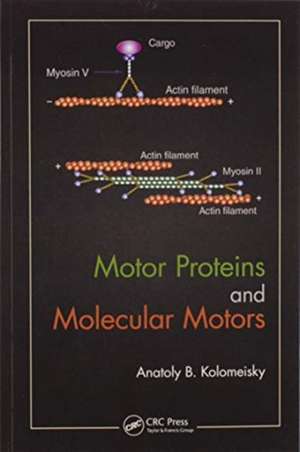Motor Proteins and Molecular Motors
Autor Anatoly B. Kolomeiskyen Limba Engleză Paperback – 30 iun 2020
Motor Proteins and Molecular Motors explores the mechanisms of cellular functioning associated with several specific enzymatic molecules called motor proteins. Motor proteins, also known as molecular motors, play important roles in living systems by supporting cellular transport and force generation via the transformation of chemical energy into mechanical work.
The book presents established results, theoretical methods, and experimental observations related to biological molecular motors. It uses fundamental physical-chemical concepts and methods to develop a systematic theoretical framework for understanding motor protein dynamics. The author introduces the main ideas using simple arguments that avoid heavy mathematical derivations in favor of more intuitive physical understanding. Although the book assumes some rudimentary knowledge of cell biology, calculus, and basic ideas from chemistry and physics, it gives explanations and derivations for most results.
Accessible to students and researchers in a wide range of scientific fields, this book provides a unified molecular picture for analyzing motor proteins. It connects major experimental facts on molecular motors to principal theoretical concepts consistent with the fundamental laws of chemistry and physics.
Preț: 430.43 lei
Nou
Puncte Express: 646
Preț estimativ în valută:
82.37€ • 88.07$ • 68.67£
82.37€ • 88.07$ • 68.67£
Carte tipărită la comandă
Livrare economică 18 aprilie-02 mai
Preluare comenzi: 021 569.72.76
Specificații
ISBN-13: 9780367575762
ISBN-10: 0367575760
Pagini: 222
Dimensiuni: 156 x 234 x 12 mm
Greutate: 0.32 kg
Ediția:1
Editura: CRC Press
Colecția CRC Press
ISBN-10: 0367575760
Pagini: 222
Dimensiuni: 156 x 234 x 12 mm
Greutate: 0.32 kg
Ediția:1
Editura: CRC Press
Colecția CRC Press
Cuprins
Introduction. Basic Properties of Motor Proteins. Experimental Studies of Motor Proteins. Fundamental Physical Concepts: Equilibrium Approaches. Fundamental Physical Concepts: Non-Equilibrium Approaches. Motor Proteins as Enzymes. Theory for Motor Proteins: Continuum Ratchets. Theory for Motor Proteins: Discrete-State Stochastic Models. Collective Properties of Motor Proteins. Artificial Molecular Motors and Rotors. Future Directions in Studies of Motor Proteins and Molecular Motors. Index.
Recenzii
"Life is a motion!" (p. xvii) opens this volume that endeavors to provide a physical-chemical framework for understanding the working principles of motor proteins…The first part of the book introduces the physical foundations, starting with diffusion and then discusses a number of techniques, including stopped flow, force spectroscopy, and super-resolution microscopy. The second part covers fundamental physical and chemical concepts, starting with equilibrium approaches before moving to nonequilibrium approaches and enzyme kinetics. Two pleasing touches are biographical details of the scientists who established the founding principles, and the inclusion of questions important to the motors field that are used to frame the discussion of the theoretical concepts.
In the third and defining section of the volume, the author presents two theoretical approaches for modeling molecular motors: Continuum Ratchets and Discrete-State Stochastic models. Having published a number of papers using both approaches, Kolomeisky is the ideal person to present the foundations as well as the strengths and weaknesses of each approach…Overall, the volume is clearly written and will be of value to graduate students and researchers across multiple disciplines related to mechanobiology and nanotechnology. The treatment of modeling approaches is unique and the strongest aspect of the book, but the coverage of fundamental experimental and theoretical concepts underlying motor protein research will also be of value for researchers spanning cell biology, biophysics, and applied mathematics. Most importantly, this volume focuses most on the physical-chemical fundamentals of motor proteins, which will remain foundational as the field moves forward."
—William O. Hancock, Pennsylvania State University, in THE QUARTERLY REVIEW OF BIOLOGY, Volume 93, June 2018
"As a chemical physicist dabbling in molecular biophysics, I am particularly intimidated by th
In the third and defining section of the volume, the author presents two theoretical approaches for modeling molecular motors: Continuum Ratchets and Discrete-State Stochastic models. Having published a number of papers using both approaches, Kolomeisky is the ideal person to present the foundations as well as the strengths and weaknesses of each approach…Overall, the volume is clearly written and will be of value to graduate students and researchers across multiple disciplines related to mechanobiology and nanotechnology. The treatment of modeling approaches is unique and the strongest aspect of the book, but the coverage of fundamental experimental and theoretical concepts underlying motor protein research will also be of value for researchers spanning cell biology, biophysics, and applied mathematics. Most importantly, this volume focuses most on the physical-chemical fundamentals of motor proteins, which will remain foundational as the field moves forward."
—William O. Hancock, Pennsylvania State University, in THE QUARTERLY REVIEW OF BIOLOGY, Volume 93, June 2018
"As a chemical physicist dabbling in molecular biophysics, I am particularly intimidated by th
Descriere
This accessible book explores the mechanisms of cellular functioning associated with several specific enzymatic molecules called motor proteins. It presents established results, theoretical methods, and experimental observations related to biological molecular motors. The author uses fundamental physical-chemical concepts and methods to develop
